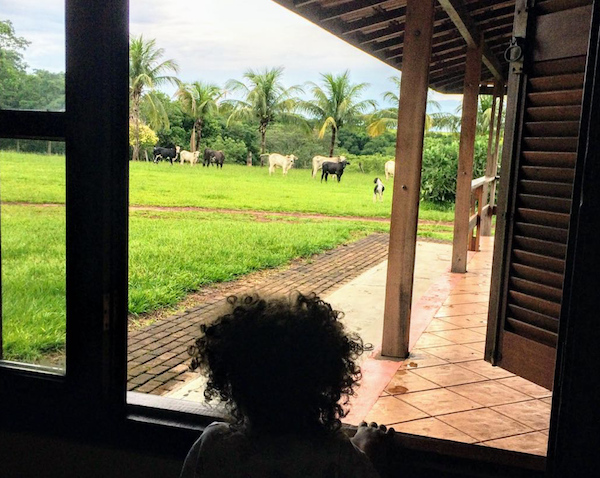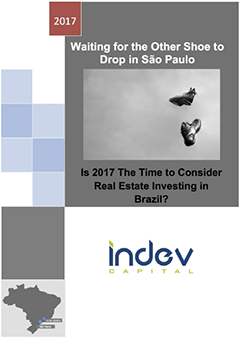
My two-year-old daughter, gotta love the morning hair, waking up in the middle of nowhere Brazil on a wonderful weekend escape far far away from the Urban Jungle of São Paulo.
There’s No Free Lunch, Particularly If It’s Not Yours
As most readers have now realized, although I am a native of The Great State of North Carolina, I live, quite happily actually, in the megalopolis of São Paulo, Brazil. Recently for New Year’s Eve weekend, an entrepreneurial friend of mine invited me and my family to her ranch, pictured above. The wonderful ranch was quite a change from the hustle and bustle of São Paulo. The nearest town was 25 minutes away by car and the nearest neighbor almost as far. When one lives in a city of 12 million like São Paulo, these types of experiences are quite welcome, refreshing, and highly suggested.
The owner of the ranch, let’s call him Joaquim, is a classic entrepreneur. A solid guy who picked a niche industry, executed a strategy, built a team, attacked a given sector, worked hard for about 30 years (perhaps the most important part of the story), and made a pile of money. As the ice cold beer flowed during a pleasant dinner of Brazilian BBQ beef, he told me to my surprise that his ranch in the middle of nowhere had been robbed. While this was a surprise, these things happen anywhere and petty theft in homes while people are not home happens in São Paulo and Oakland (I was just there and can verify).
However, what was most surprising, and almost caused me to swallow said ice-cold beer in the wrong direction, never a pleasant experience, was that after robbing the ranch home of its higher-end electronics, several weeks later the criminal sent a “minion” to the same ranch 20 minutes from any civilization to ask Joaquim if he wanted to negotiate to buy back his own TV, printer, etc. at a discount. I am not making this up… Talk about a free lunch!
Corruption’s Demise Opens the Door
to Opportunistic Investments in Brazil
Purpose of This Newsletter
After hearing this story, I started to think of some of the large-scale corruption cases in Brazil involving Petrobras (Lava Jato) and what drove people to behave this way. Obviously, the lack of shame and almost a psychopathic lack of concern for others must exist. Coming back to an isolated ranch to negotiate to sell back what was stolen, (perhaps in the small town no one could afford the stolen goods) showed a different reality of what was possible in petty theft. Joaquim’s example really was almost unimaginable for me.
Many questions came to mind. Was this person different from the common criminal who exists in other nations? How much does this corrupt behavior cost society? How does such a person sleep at night? Is there no shame? Where was this person’s moral compass? Does this person have friends (I had better stay away)? Does the Lava Jato crackdown, Brazil’s effort to put the highest-level corrupt business and government officials in jail, change the calculus of corruption?
Importantly, this conversation about corruption and the Brazilian population’s growing disgust with traditional politicians is driving a potential new direction in the political order. Can this large-scale corruption crackdown change Brazil? As change creates opportunities, how can the opportunistic investor take advantage of this moment?
Social Psychology of Corruption
After hearing about our petty thief’s attempt to sell back stolen products to their owner, I realized that I obviously needed to study this phenomenon. What was this type of individual’s “moral identity” or “surrounding circumstances”? He or she was not created in a bubble.
Human Consequences of Actions – A Separation
I remember hearing about a fight in a certain Palm Beach Country Club between members due to one member’s recommendation that another invest in one of Bernie Madoff’s funds, a quick way to lose a friendship if there ever was one. The impact of Mr. Madoff’s crime was severe. Several individuals lost hundreds of thousands and sometimes millions. Painfully, according to an article in Reuters citing the Jerusalem Post, at least US$600M in Jewish Charitable Funds were wiped out, not to mention countless losses in other communities and charities. Truly tragic…
Due to Madoff’s accounting trickery, during his corrupt ponzi scheme he did not see his crime’s impact (neither did those he was robbing over decades). On the contrary, he was thought of as a hero due to his fund’s consistent high returns. While Madoff’s results were catastrophic, strangely and incredibly only at the end was the pain caused, when people realized all the returns were false. Perhaps even for a person with clearly psychopathic tendencies, if the scale of Madoff’s crime were visible to others and to him, even he or those around him would have stopped these acts.
This separation of corrupt deed from seeing its actual impact is important for a corrupt act to gain scale and to gain the needed support, or at least acceptance, of those assisting in the crime’s execution.
Loyalty – Follow the Leader? The Case of Odebrecht
In cases where bribery and corruption reach truly epic levels like that of Odebrecht (direct and indirect estimates of approximately US$3B in bribes or extra profits), at one point Latin America’s largest construction company, where not only one person but a large business organization is involved in corruption, things get even more complex. Amazingly, here there was actually a separate department to execute these acts.
The former CEO and Prince of Construction in Brazil, Marcelo Odebrecht, would obviously have a loyal group of followers in any circumstance. When this natural CEO leadership role (from my understanding, besides the accused and convicted acts he was and is highly competent) is combined with the strong social bonds of Brazil, there is significant social pressure to follow the leader. Those around such a powerful figure would feel a strong commitment to the group or person committing the corruption. In addition, they would feel an obligation to at least remain silent if not participate. As this behavior continues, obviously it begins to change the corporate culture.
Reciprocation – South Africa Fishery Enforcement

I recently read a funny story in an article, “The Social Psychology of Corruption” by Jonathan Ruscht, about reciprocation among South Africa’s Fishery Enforcement Inspectors. A 2015 study of corruption affecting South African fishery enforcement explained how reciprocation worked within this sector. Fishermen gave inspectors fish (obviously, this is their main resource). If one accepted the fish, there was an implicit acceptance that in the future the fisherman would likely desire something in return. Eventually, some inspectors had large freezers in their offices to accommodate bribes.
One of the reasons that LAVA JATO was able to get so large and last so long was that the “fish,” or in Lava Jato’s case money, provided for reciprocation was distributed to a larger group, particularly politicians, so the desire to keep quiet or be involved and get a small cut was high. Well, Fred is doing it, why not me?
While fresh seafood is always a welcome pleasure, cash is a much more flexible medium of exchange.
Scarcity or Unique Moments of Time

Rio’s recent governor, Sérgio Cabral, was governor during a historical period for Rio. He was at the helm when the city, Cidade Maravilhosa, won the right to host the World Cup and Olympics, and oil prices were at an all-time high. It was a rare moment of opportunity, particularly for someone corrupt with control of the city’s budget. Sadly, the governor stole a cool US$70M from the state and had a huge impact on state finances. Indeed, the combined oil downturn (our corrupt governor could not predict this) and less government revenue due to Brazil’s downturn have left the state in quite a financial bind. Mr. Cabral took advantage of a unique moment in Rio’s history for personal gain.
The impact on Rio has been devastating. The amount stolen is the equivalent of educating almost 70,000 children in Rio’s public schools or funding eight months of operations of Rio’s 29 emergency care units, or the entire police budget for 2015.
Similarly, the Lava Jato corruption began in 2009, near the PEAK of Brazil’s economy (Brazil had a brief downturn due to the financial crisis but quickly recovered and roared back with significant GDP growth in 2010). All mouths were fed and things were easier to hide. It was a rare moment and those with power or influence took advantage. Timing is important in both legitimate and illegitimate business operations.
Commitment and Consistency
One of the more interesting cases of commitment and consistency involved Senator Aécio Neves, a scion of an important political family who barely lost the presidency, and Joesley Batista, CEO of the world’s largest protein supplier. Impressively, this case happened after Lava Jato top-level officials were already in jail. Evidently, Mr. Neves met with Mr. Batista and received a loan for approximately US$600K. This type of behavior only makes sense if this was not the first time, or if the senator believed no one was watching. Obviously, Brazil’s Federal Police had become much more rigorous. After all the cases that had already put politicians in jail, it seems quite odd that a very smart senator and almost president (lost the Presidency by less than 2%) would execute this type of loan at this time in Brazil. His political leadership of PSDP, Brazil’s lead right-of-center party, is now over and his apology, shown here, was ridiculed by almost all citizens in Brazil. The rapid rejection of Mr. Neves by his party and the nation shows that a change has occurred.
The Shift – Can a Country Change?
Brazil’s population, perhaps for the first time in large numbers and at various class levels, is now highly political and aware of corruption. Mr. Neves’ plea of innocence was widely ridiculed across all social levels. The arrest and condemnation of super elite businessmen and politicians is completely new to Brazilian society. These arrests were a shock to the system of impunity that had existed for decades.
A Quiet Conversation
I spent some time recently with a psychologist in Brazil, let’s call her Marta. My question was whether a person involved in corruption in a society with such great inequality who is already living quite a good life feels guilt or even thinks of their behavior as corrupt. During the conversation, I learned that before Lava Jato, this high-level corrupt official knew that their behavior was wrong but did not care as there was a very low chance of punishment. This type of person created their own legal reality and used a legal system where a prosecution process could be delayed indefinitely. If a human being does something wrong and is not punished, he or she will do it again as there are no adverse consequences. Many if not all of the executives now in jail are as surprised to have been punished as you would be if you won the lottery tomorrow, perhaps more so actually.
(By the way if you win the lottery, please do not forget your favorite opportunistic investments newsletter writer here in São Paulo…. )
The strong support of the Lava Jato investigation by Brazil’s public has generated greater commitment from the prosecuting authorities. This combination of public condemnation and effective legal action has radically changed the cost benefit of corrupt acts.
Brazil is a society where at least two past politicians are well-known to have used the campaign slogan, “I steal but I work.” This attitude, and the resultant “I am above the law” entitlement, no longer exists. For perhaps the first time in Brazil, people have come to believe that there is punishment for anyone independent of their social level.
Lula
Luiz Inácio Lula da Silva is a historic figure and is the most popular Brazilian politician by far since Brazil emerged from a dictatorship in 1985. His popularity was created through an incredible economic run largely based on a commodity supercycle, a large demographic bonus, and an economic team in his first term that followed his predecessor’s correct economic approach.
Alas, even the most popular president in the country’s history is not above the law. Lula has been convicted of corruption and money laundering and there is a chance that he may actually go to jail. The law and its punishment have truly reached the highest levels of society and this is a significant change in Brazil.
Change Happens
Change in Brazil is clearly occurring. One clear example is the new focus on corporate governance and compliance. Many of the companies that were in Lava Jato now have independent board members. Some large relevant examples are OAS, Pactual, Odebrecht, and JBS. In many large companies in Brazil, dedicated compliance professionals have been hired. Along with this shift, corporate Brazil is much more transparent with all campaign donations and activities with politicians.
No company, particularly after the damage to shareholder value and corporate image that occurred to such companies as Pactual / Odebrecht / others, desires this significant reputational and financial risk.
The strong involvement by Brazil’s population combined with the commitment of prosecutorial authorities has started to change society. For perhaps the first time, there is fear and regret among those accused and an ostracization from society. The end of corruption’s “free lunch” has arrived.
Change and Impact on Investing – A More Level Playing Field
This shift in methods of doing business, with less grey area, will likely result in fairer competition for opportunities. In addition, as corruption works its way out of the system, some opportunities will come about due to the change in business behavior. Corruption effectively created a different cost of capital for some opportunities and prevented some high quality investment opportunities from hitting the market.
Small niche asset managers are now aggressively moving forward with large-scale acquisitions. Levered companies have no “free lunch” method to avoid their problems. As the de-levering occurs throughout the system, it will be on largely market terms. This need to de-lever, recapitalize, and sell assets on transparent terms for all players will create some unique opportunities for those smart global investors that are able to source high quality local co-investors to execute. Taking away a free lunch, at least for those that were corrupt and the beneficiaries, creates new opportunities for others.
If an investor is interested in learning about real estate investment opportunities in a new, improved version of Brazil based on de-levering of the economy and a new transparent reality, please reach out to me at joseph.williams@indevcapital.com.
Happy Investing and Happy Belated New Year!




